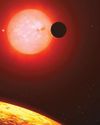يحاول ذهب - حر
'Queen of icebergs' A23a is no longer the world's biggest
Issue 208
|How It Works UK
An iceberg that was once the size of Rhode Island and the biggest in the world has lost about 80 per cent of its mass since May, scientists at the British Antarctic Survey (BAS) report.

Known as A23a, the 'megaberg' has been rapidly disintegrating since becoming trapped in a current flowing counterclockwise around South Georgia Island in the South Atlantic Ocean, Andrew Meijers, a polar oceanographer with the BAS, said. A23a was swept up by the current in May after spending several months grounded on the continental shelf just off South Georgia Island. “It has been following the strong current jet known as the Southern Antarctic Circumpolar Current Front (SACCF),” Meijers said, adding that the iceberg will likely end up travelling away from the island in a northeast direction before breaking up completely.
هذه القصة من طبعة Issue 208 من How It Works UK.
اشترك في Magzter GOLD للوصول إلى آلاف القصص المتميزة المنسقة، وأكثر من 9000 مجلة وصحيفة.
هل أنت مشترك بالفعل؟ تسجيل الدخول
المزيد من القصص من How It Works UK

How It Works UK
UNCANNY'S DANNY ROBINS
The creator and host of the BBC's Uncanny series tells us about his most chilling experiences while researching the show, and writing a ghost book for children
4 mins
Issue 208

How It Works UK
HOW FEATHERS GROW
A bird's proteinaceous plumage comes from the same source as our hair
1 mins
Issue 208

How It Works UK
New EV battery technology could power 500-mile road trips on a 12-minute charge
Scientists have used a neat chemistry trick to tackle a major challenge facing future batteries.
2 mins
Issue 208

How It Works UK
HOW AIR PURIFIERS WORK
These filtration devices clean a room's air of particles that can make a person sick
1 min
Issue 208

How It Works UK
Chinese scientists hunt for alien radio signals in a 'potentially habitable' star system
TRAPPIST-1 is a red dwarf star located about 40 light years away that hosts seven Earth-sized rocky planets, with at least three orbiting in the habitable zone where liquid water could exist.
2 mins
Issue 208

How It Works UK
WHAT HAPPENS WHEN WE DIE?
Our bodies are vessels for life, but in death they undergo a cascade of chemical and biological changes
3 mins
Issue 208

How It Works UK
WHY ARE KEYBOARDS QWERTY?
There's a reason why this seemingly random arrangement of letters is widely used on keyboard layouts
1 min
Issue 208

How It Works UK
A 'quasi-moon' discovered in Earth orbit may have been hiding for decades
A new paper describes a possible 'quasi-moon' of Earth, an interloping asteroid that may have been following our planet around for decades, undetected.
1 mins
Issue 208

How It Works UK
WHAT'S AN ANTI-DRONE GUN?
How these devices intercept and disable unmanned aerial vehicles
1 mins
Issue 208

How It Works UK
Dozens of mysterious blobs discovered inside Mars may be 'failed planets'
Giant impact structures, including the potential remains of ancient ‘protoplanets’, may be lurking deep beneath the surface of Mars.
2 mins
Issue 208
Listen
Translate
Change font size
